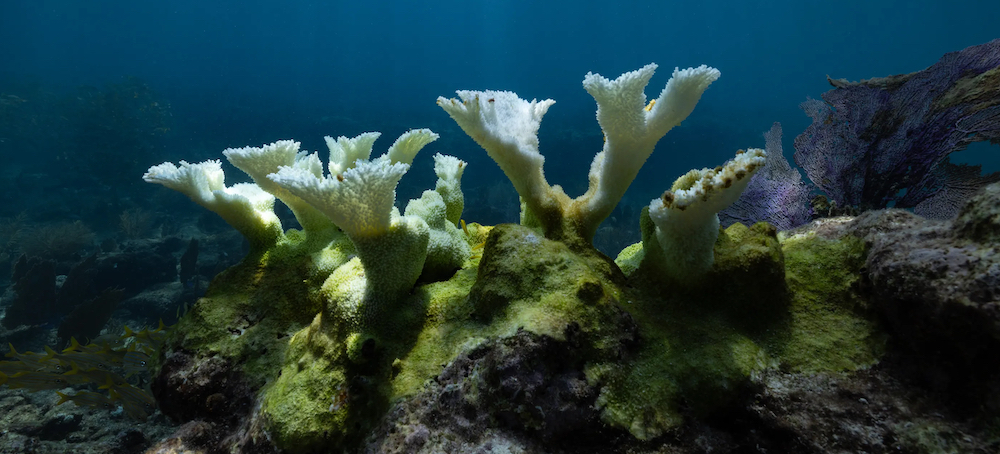Coral Scientist Predicts Massive Bleaching Events in 2024
Paige Bennett EcoWatch Bleached elkhorn coral at Pickles Reef in the Florida Keys. (photo: Jennifer Adler/Vox)
Bleached elkhorn coral at Pickles Reef in the Florida Keys. (photo: Jennifer Adler/Vox)
Ove Hoegh-Guldberg, a marine studies professor at the University of Queensland, Australia, is predicting that coral reefs will experience dramatic bleaching. Hoegh-Guldberg and colleagues shared their predictions in a “Perspectives” piece for Science.org.
Bleaching events can occur as a stress response to things such as increasing ocean temperatures and pollution, according to the National Oceanic and Atmospheric Administration (NOAA).
Currently, the world is experiencing an El Niño event, which is likely to last through March 2024, which can influence warmer ocean temperatures. The current El Niño phenomenon could then be followed by a second El Niño year. As The Guardian reported, every instance where there has been a pair of El Niño years since 1997 has been followed by mass coral bleaching around the world.
“The probability is that somewhere in the next 12 to 24 months, we are going see El Niño combine with warming sea temperatures and have a really big impact,” Hoegh-Guldberg told The Guardian. “We are literally in uncharted territory, which we know very little about and don’t know how to respond to and I think we’re dangerously exposed.”
According to NASA, El Niño can bring warmer surface waters in the Pacific Ocean and can limit upwelling, which brings nutrients from the cooler waters deeper in the oceans. Without the upwelling, marine life may die off or move elsewhere. But the El Niño phenomenon can vary from event to event, and each El Niño can impact different parts of the world in unique ways.
In May 2023, United Nations’ World Meteorological Organization (WMO) warned that El Niño, coupled with rising greenhouse gas emissions and climate change, could push the annual global average temperature past 1.5 degrees Celsius over pre-industrial levels by 2027.
“We don’t know the implications of such a spike in temperature,” Hoegh-Guldberg said. “We may see storms that are even larger than the ones we’ve been seeing. These are the warmest temperatures ever on land and sea.”
Hoegh-Guldberg is urging governments to take quicker action to curb greenhouse gases and avoid mass coral bleaching. If the corals experience a die-off, it will disrupt marine ecosystems.
“This is a science-based engineering problem,” Hoegh-Guldberg told The Guardian. “We need to set the parameters. We need to define the way our planet works and do it in record time. Because we’ve got resources, we can do it. But we’ve got to be smart and involve everyone. And make sure that we get a system that’s going to cool the planet for a while, or at least not increase for a while.”



